This article was co-authored by Lucy V. Hay. Lucy V. Hay is an author, script editor and blogger who helps other writers through writing workshops, courses, and her blog Bang2Write. Lucy is the producer of two British thrillers and her debut crime novel, The Other Twin, is currently being adapted for the screen by Free@Last TV, makers of the Emmy-nominated Agatha Raisin.
There are 11 references cited in this article, which can be found at the bottom of the page.
wikiHow marks an article as reader-approved once it receives enough positive feedback. This article received 56 testimonials and 86% of readers who voted found it helpful, earning it our reader-approved status.
This article has been viewed 1,213,705 times.
Competition is stiff in the television industry, even more if you don't have your name out there already as shows come and go rapidly. Knowing how to write and pitch your original ideas or scripts will give you a huge leg-up, allowing you to get your ideas into the open and get paid in return.
Steps
Developing the Concept
-
1Come up with your "what if?" premise. This is the premise of every single TV show and idea to run through Hollywood. It can be as simple as "what if a documentary crew filmed a small paper company?" (The Office) to complex ideas like "what if a chemistry teacher started cooking meth?" (Breaking Bad). This is the basis of your show -- what sets it apart, and what will make it sell.[1]
- You don't need, or want, to weigh this down with a lot of subplots or other ideas yet. Just get the essence of your show on paper. Seinfeld, after all, was famously pitched as "what if we did a show about nothing?"
-
2Research current televised programming to learn about current trends or opportunities.[2] Use "the trades," such as the ubiquitous and essential Deadline.com or Variety to keep up to date about current Hollywood TV trends. For example, Deadline ran a story in August, 2015 stating that networks were looking specifically for 1-hour comedy shows to try out. This can be a good hint as to what is currently selling.[3]
- Write down names and studios attached to projects that seem like yours. These are the names most likely to buy your work later.
Advertisement -
3Determine your genre. Genre is the type of show you're making, from sitcom to murder mystery. There are a lot of nuances to genre, but when in doubt you should look up the genres of your favorite shows online for guidance. For example, Arrested Development is a "single-camera sitcom, meaning there is no studio audience like in classic sitcoms like Cheers, which is a "multi-cam sitcom. This difference, though subtle, makes a huge difference when pitching your show, because some networks only want certain shows.
-
4Develop some characters. The essence of all good TV is the character. Characters are why people tune in week after week and what drives the plot of each episode.[6] Try and come up with between 2-5 main characters, as any more becomes difficult to manage, with 7 main characters (Community, most dramas) being the upper limit. You characters should be:
- Round. The characters have multiple facets, not just an "angry woman," or "strong hero." Round characters have strengths and weaknesses, and the chance to grow.
- Filled with desires and fears. Their ability or inability to get over their fear (of being poor, of being alone, of space aliens, of spiders, etc.) is what drives their conflicts each episode and shows you the goals in the series.
- Have agency. A good character makes choices which push forward the plot. They make mistakes, try and fix things, go to parties, etc. because it is something their character would do, not something the writer needs them to do.[7]
-
5Understand what makes a great idea sellable. Development executives are the people who green-light new ideas, and they hear a lot of them. The best ideas, or at least the ones that get through, share a few traits:
- Originality: Has this been seen before? Is it similar to anything else and, if so, is it different enough to stand on its own?
- Projected Cost: Few studios will risk hundreds of millions of dollars on an unproven writer or filmmaker. It is difficult to sell big concepts like The Walking Dead if you've just started working in TV, because they have high financial risk.
- A Screenplay/Proof of Concept: This means writing a treatment, script, or shooting some sketches. Your idea may get you in the door, but you need some work to prove that the show is going to get made.[8]
Writing A Treatment
-
1Come up with your title. The catchier the better. Most TV shows are based on some sort of play on words, and having a good turn of phrase can ensure that your show is immediately recognized. Mad Men, for example, is about Ad Agencies and the men that work there, most whose lives are spiraling out of control. Community is about a community college, but also a group of close-knit. The importance of a great title can not be underestimated.
-
2Write a catchy logline. The logline is a one or two sentence description of your show designed to sell producers on the idea. It typically tells the main agenda of the show and/or main character. If your concept can’t easily translate to a logline it might not be very marketable, but this is rare. It should tell people what they're watching and what clever hook or premise there is in the show.
- Back to the Future: A high school student, is sent to the past on accident, where his presence causes his parents to never meet -- or make him![9]
- Jaws: A police chief battles a killer shark despite being afraid of the sea. Meanwhile, the greedy town board refuses to admit there is a problem at the beach at all, complicating matters.
- Ratatouille: A French rat teams up with a terrible chef to prove that anyone can cook, though jealous critics and pest-control will do anything to prove that it is a sham.[10]
-
3Write a 300-500-word synopsis. This is a brief but comprehensive overview of the show. There are a lot of potential elements that you can put into this synopsis, but the shorter the sweeter. Try to distill your show into an engaging, brief write-up, the kind of thing that would make you want to watch the show if it was on. Some things to include are:
- The setting.
- The general plot of the series.
- The arc of most episodes (what is generally happening in every episode?)
-
4Create a short but detailed character sheet. On a separate sheet, list each character with a 1-2 sentence overview of who they are. Keep it brief and specific. What makes these characters tick, and what makes them special? Unless it is important to the plot, never include physical details or casting choices.
-
5Give a 3-4 episode breakdown. This is a brief 1-2 paragraph outline of several episodes. You want to give someone a chance to see how the show will play out, what each episode will look like, and an idea of the budget and characters in action. If you're writing a drama, you might have 4-500 words each, and try and keep 30-minute shows closer to 2-300 words.
- If you're pitching a documentary-style reality series, having any short video on the subject or people involved can help producers see the potential of the project. You can also outline potential plot lines in the people's lives.
-
6Put your treatment together. The final document should be 3-10 pages, with all of the parts in order. Add a title page with the show's potential logo, your name, and your contact information. In order, you should have:
- Title
- Logline
- Synopsis
- Characters
- Episode arcs.[11]
- If you are creating a reality television show, ensure that you are creating an executable format. In the case of reality competition shows, ensure that every aspect of gameplay is outlined. It is important to write what we are specifically watching unfold in brief, yet powerful points.
-
7Consider writing a script. At the end of the day, the treatment will not be on TV. Having a script to go with it means you can give someone the first episode, right off the bat, if they like the idea. That said, many ideas are sold solo, then a script is commissioned later. This is more common if you are already established in Hollywood, however.
- Read scripts from shows similar to yours to get an idea for the writing and plotting.[12]
- If you are writing a scripted TV show, such as a drama, learn how to write scripts. Script-writing classes can also be taken at local community colleges.
- Specialized script-writing software can make quick work of a script. Movie Magic Screen Writer, Celtx, Writer Duets, and Final Draft are popular picks.
-
8Register your project with any copyright system service such as the Writers Guild of America. This will protect your intellectual property and give you time-stamped proof of creation. You may also wish to register your project online with The Creator's Vault or file for copyright protection, though this is often overkill.
- Registering with the WGA will cost just $20 ($10 at the WGA site if you are already a WGA member), and is considered the industry standard.
- The registered material is kept on file for five years, at which time you may renew. Terms may vary per service and site.
Pitching Your TV Show
-
1Add your material to a searchable online industry database. These sites cost money, but in return allow network executives to peruse your scripts. Usually you pay to get a rating, and high-rank scripts will shoot to the top of the lists. However, many of these sites are unreliable, so be sure to look them up online to find reviews, testimonials, and successes. Look up any "success stories" from the site on IMDB to check their reliability.
- Accepting unsolicited submissions without a mediator puts companies at risk of being accused of stealing. Getting electronic proof of review by companies is a unique benefit that the Internet provides in today's television development arena.
-
2Create a list of appropriate companies that might like your idea and approach them online. Go online and find phone numbers, emails, submission ideas for companies that are making shows similar to yours. Get in touch however you can, talking to them about opportunities to meet and discuss your ideas. You don't to be needy, just willing to put in some effort to sell your script.
- You would never pitch a cheesy monster movie to NBC, you'd send it to SyFy. You wouldn't send a Historical Drama to Greg Danial's (The Office) production company. Think about what the studio is already making to pitch to the right people.[13]
- Look into studio fellowship programs. These are paid 6-8 week programs that allow you to hone your ideas at the studio. They are, however, incredibly competitive.
-
3Network with everyone you can. Meeting people is still the best way to sell any idea or show. Grab coffee with friends, join an improv group, and take jobs on movie sets. Even if one person isn't able to make your idea a reality, they may know someone who could help.
- When possible, work on film and TV sets as a production assistant or intern -- anything to get your foot in the door.
- While not strictly necessary, selling your idea to Hollywood is easiest if you're in Hollywood. If you're serious, it's time to move to LA. A lot of TV is also produced, however, in NYC.
-
4Know that you'll need an effective pitch to sell your idea once you're in the door. You need to knock the executives out once they give you a chance to speak. Pitching is an art form, but it is more of a sales pitch than a script. Your goal is simply to get people excited about the show, to put the image of the show in the executives' minds so they can envision the final product. To do that, talk about:
- The Hook: Return to the "what if" of your show. Why is it original, compelling, and worth watching?[14]
- The Audience: Who is this show geared towards? How does it fit with the network's current audience.
- The "Trailer:" If you were selling this show in a commercial, what parts would you highlight? What are the "clips" that flesh out the world of the show.[15]
-
5Remember to be a salesperson, not a writer. Why does your show fit their audience? How does it complement their other shows? Why do they need your show? Don't just talk about how awesome you or your show is, talk about why it is a good decision for them to buy it.
- You must know what types of shows the network produces, and who its audience is, to capture its attention.[16]
-
6Pitch quickly and energetically. Your pitch should be no more than 12-15 minutes, and the shorter the better. Give the executives the idea of the show, hook them into the premise, and let them know why it is a good fit for their network. Then say thanks and answer any questions.
- You must practice your pitch ahead of time, multiple times. It needs to be as well prepared as your script and treatment.
- It can help to have multiple other ideas on hand too, even if they don't have a treatment. They may love you and your idea, but not have room in the schedule for that specific show.
Expert Q&A
Did you know you can get expert answers for this article?
Unlock expert answers by supporting wikiHow
-
QuestionHow can I write for television with no experience?
 Lucy V. HayLucy V. Hay is an author, script editor and blogger who helps other writers through writing workshops, courses, and her blog Bang2Write. Lucy is the producer of two British thrillers and her debut crime novel, The Other Twin, is currently being adapted for the screen by Free@Last TV, makers of the Emmy-nominated Agatha Raisin.
Lucy V. HayLucy V. Hay is an author, script editor and blogger who helps other writers through writing workshops, courses, and her blog Bang2Write. Lucy is the producer of two British thrillers and her debut crime novel, The Other Twin, is currently being adapted for the screen by Free@Last TV, makers of the Emmy-nominated Agatha Raisin.
Professional Writer Concentrate on making contacts for later while also working on your writing. Try following agents and production companies online, learning about the industry, and gaining an understanding of what the industry wants. Though the writing is important, so is the business. Think about creating entertainment that people want to see, and study things like target audience, genre, genre conventions, and the type of things that sell well versus what does not sell well.
Concentrate on making contacts for later while also working on your writing. Try following agents and production companies online, learning about the industry, and gaining an understanding of what the industry wants. Though the writing is important, so is the business. Think about creating entertainment that people want to see, and study things like target audience, genre, genre conventions, and the type of things that sell well versus what does not sell well. -
QuestionWhat makes a great script?
 Lucy V. HayLucy V. Hay is an author, script editor and blogger who helps other writers through writing workshops, courses, and her blog Bang2Write. Lucy is the producer of two British thrillers and her debut crime novel, The Other Twin, is currently being adapted for the screen by Free@Last TV, makers of the Emmy-nominated Agatha Raisin.
Lucy V. HayLucy V. Hay is an author, script editor and blogger who helps other writers through writing workshops, courses, and her blog Bang2Write. Lucy is the producer of two British thrillers and her debut crime novel, The Other Twin, is currently being adapted for the screen by Free@Last TV, makers of the Emmy-nominated Agatha Raisin.
Professional Writer Writing a great script for TV is the same as writing a great script for anything, whether it be a short film or a feature film. Make sure you have a great concept as well as a strong sense of structure and character. All of those need to be amazing in some way, as the competition is too stiff to rely on only one of those.
Writing a great script for TV is the same as writing a great script for anything, whether it be a short film or a feature film. Make sure you have a great concept as well as a strong sense of structure and character. All of those need to be amazing in some way, as the competition is too stiff to rely on only one of those. -
QuestionCan I do this if I am a teenager?
 DonaganTop AnswererIf your idea is good enough, they won't care what your age is. However, you will have to jump through a few contractual hoops an older person would not.
DonaganTop AnswererIf your idea is good enough, they won't care what your age is. However, you will have to jump through a few contractual hoops an older person would not.
Warnings
- Getting electronic proof of copy or WGA registration can help prevent someone from stealing your ideas.⧼thumbs_response⧽
References
- ↑ Lucy V. Hay. Professional Writer. Expert Interview. 16 July 2019.
- ↑ Lucy V. Hay. Professional Writer. Expert Interview. 16 July 2019.
- ↑ http://deadline.com/v/tv/
- ↑ Lucy V. Hay. Professional Writer. Expert Interview. 16 July 2019.
- ↑ http://www.visualwriter.com/ScriptDr/Advanced/Genre.htm
- ↑ Lucy V. Hay. Professional Writer. Expert Interview. 16 July 2019.
- ↑ http://terribleminds.com/ramble/2014/01/13/25-things-a-great-character-needs/
- ↑ https://www.bbc.co.uk/blogs/writersroom/entries/e9f4db68-3ec3-4041-b67f-14841afc3de5
- ↑ http://www.indiewire.com/article/how-to-write-the-perfect-logline-and-why-its-as-important-as-your-screenplay?page=2
- ↑ http://www.movieoutline.com/articles/writing-good-log-lines.html
- ↑ http://www.writing.ie/resources/tv-treatments-what-they-are-and-why-you-need-one-part-1-of-2/
- ↑ Lucy V. Hay. Professional Writer. Expert Interview. 16 July 2019.
- ↑ http://www.scriptmag.com/features/producers-pov-how-and-where-should-i-pitch-my-tv-show
- ↑ http://www.josephfinder.com/writers/tips/whats-a-hook-the-art-of-the-pitch/
- ↑ http://www.indiewire.com/article/how-to-develop-a-pitch-an-excerpt-from-the-hollywood-pitching-bible
- ↑ http://www.scriptmag.com/features/producers-pov-how-and-where-should-i-pitch-my-tv-show
About This Article
If you want to write and pitch an idea for a TV show, start by coming up with a catchy title that captures what your show is about. You should follow this up by writing a logline, which is a 2-3 sentence description of your show. Next, create a 300-500-word synopsis that provides an overview of the show, including things like the setting and plot. Additionally, make a character sheet with a summary of each character. Then, register your project with the Writers Guild of America to ensure copyright protection, and send it to your chosen TV channel. For tips on how to network with others to promote your show and how to put it on online databases, keep reading!


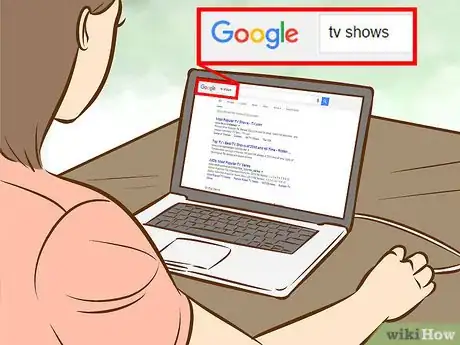




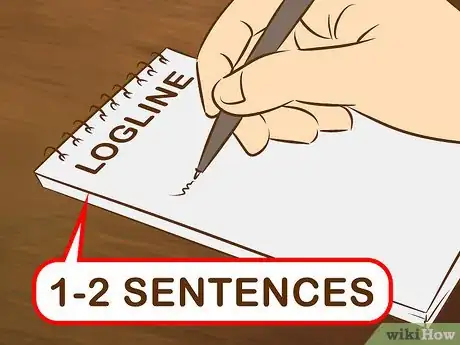

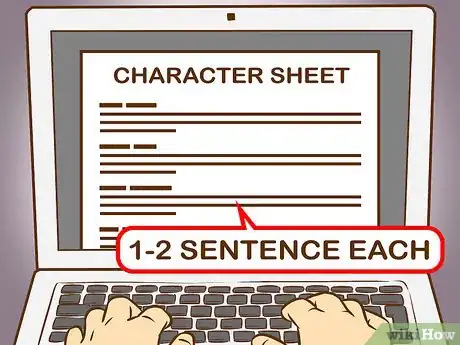

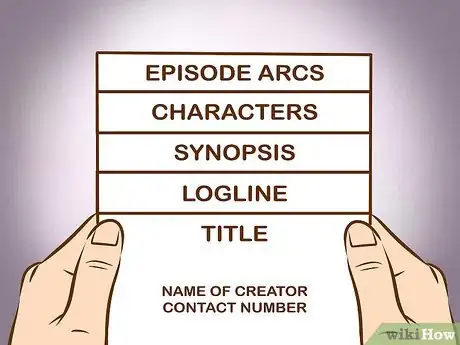

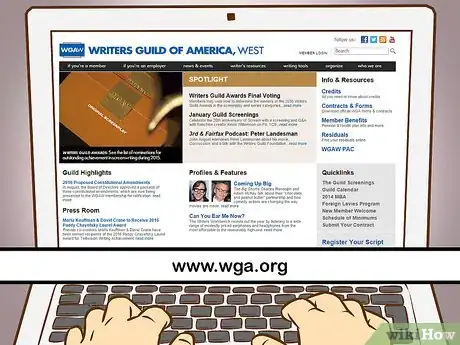









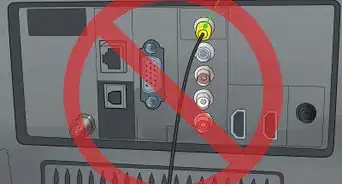
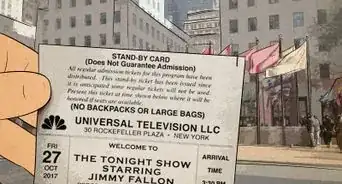
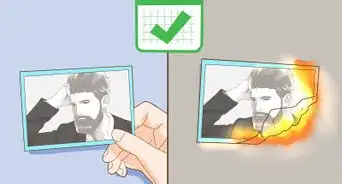




-Step-17.webp)

















































